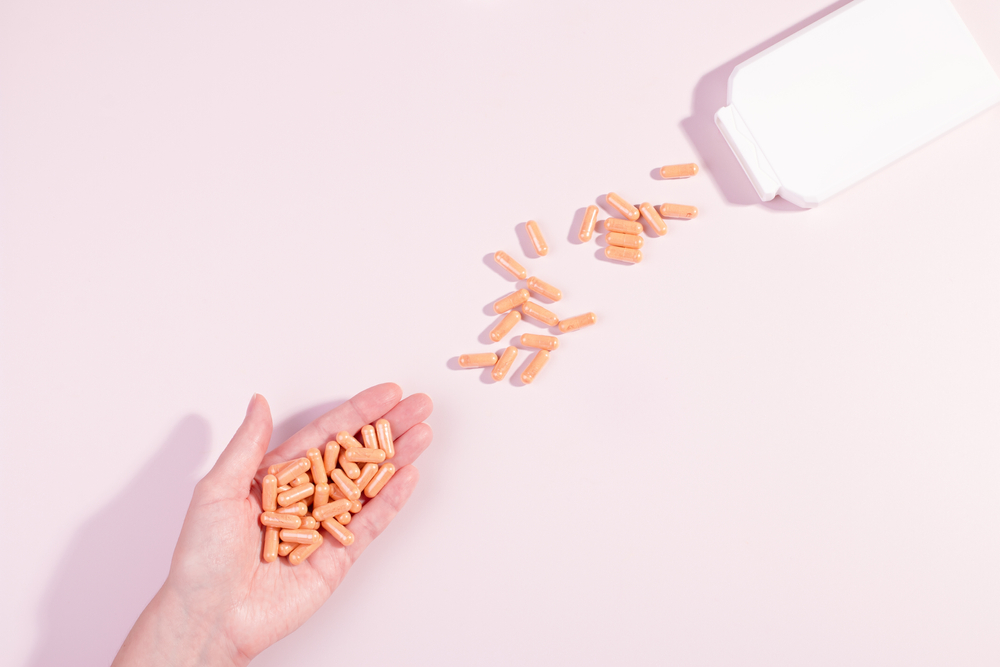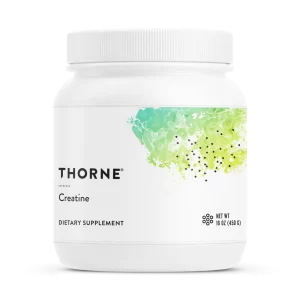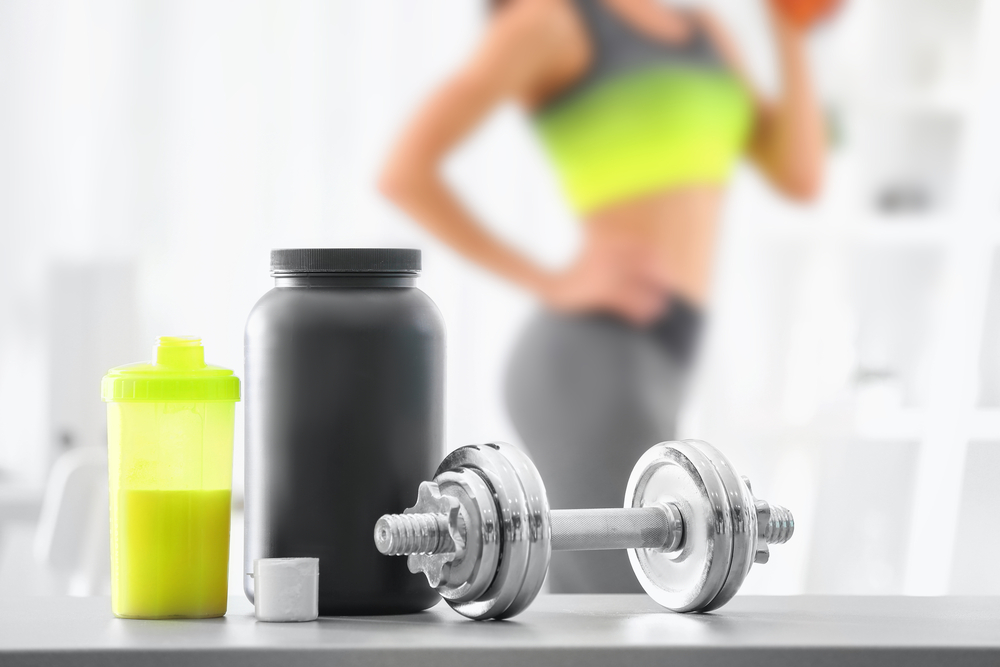DISCLAIMER: Always consult with a healthcare professional before starting any new routines, programs, or nutrition plans to ensure you receive the best medical advice and strategy for your specific individual needs.
Every day we hear or read about another miracle supplement claiming to improve our health or athletic performance. From vitamins and minerals to melatonin, probiotics, and fish oil, each one is advertised as the best on the market, oftentimes with no substantial evidence to support such claims. Creatine, however, a supplement long used by bodybuilders and athletes, may offer some real benefits. And it’s not just sportspersons and musclemen that creatine makes sense for. Women can also benefit from supplementation, especially near and after menopause.
Besides muscle growth and performance, creatine supports bone health, improves focus and cognitive function, boosts energy levels, and fights fatigue, helping midlife women feel healthier and fitter during menopause.
So, let’s look closely at how creatine benefits women over 40. But first.
Update: Recent (2024–2025) Research & Expert Commentary Say (Recap & Updates)
- A 2025 article aimed at midlife women recommends creatine as part of a “women over 40 fuel kit,” citing benefits for memory, bone density, muscle mass (with resistance training), and reduced inflammation. EatingWell
- Experts emphasize creatine’s safety and utility for “healthy aging,” noting its role in maintaining lean mass and functional capacity as people age. Northeastern Global News
- Reviews highlight that women may respond favorably to creatine supplementation because baseline creatine stores and endogenous production may decline with age — making supplementation more impactful. Healthline
- The most effective protocols combine creatine (e.g. 3–5 g/day or ~0.1 g/kg/day) with regular resistance training. Frontiers
Practical Considerations & What to Do (If You’re Considering Creatine)
- If you’re over 40 and want to support muscle, bone, strength, and possibly cognition — supplementation may be more beneficial when paired with a consistent resistance training program rather than taken alone.
- A typical dose in research is around 3–5 grams/day of creatine monohydrate (or ~0.1–0.14 g/kg/day) during training cycles. Frontiers
- Consider it as part of a broad healthy-lifestyle strategy: adequate protein, strength- or resistance-training, bone-friendly diet, good sleep — rather than as a standalone “fix.”
- As with any supplement, check with a healthcare provider — especially if you have kidney issues or other chronic health conditions. Some research notes creatine is generally well tolerated in healthy aging adults. ScienceDirect
What Is Creatine Supplementation?
 A naturally occurring compound found in fish and meat, creatine promotes muscle growth and improves athletic performance. For exercising individuals, especially during high-intensity activities like jumping, sprinting, and weightlifting, supplementation can be highly beneficial.
A naturally occurring compound found in fish and meat, creatine promotes muscle growth and improves athletic performance. For exercising individuals, especially during high-intensity activities like jumping, sprinting, and weightlifting, supplementation can be highly beneficial.
When taken as a supplement, creatine provides the muscles with energy, resulting in gains in power and endurance. Additionally, creatine helps reduce muscle soreness and damage, thus speeding up recovery. As well as fueling the muscles and helping with recovery, creatine supplementation has been studied for its potential benefits in areas like brain health and cognition, injury prevention, and blood sugar control.
Available in a variety of forms, including tablets, capsules, powder, and premixed liquids, creatine is popular with bodybuilders, athletes, and exercising individuals looking to improve their performance. Supplementing with creatine is generally considered safe.
As always, it’s best to talk to your doctor, especially if you have any preexisting conditions or take medications such as diuretics and nonsteroidal anti-inflammatory drugs. Additionally, creatine is not recommended for breastfeeding, pregnant women, and people with liver and kidney disease.
Also, if you consider taking creatine, it is important to stay properly hydrated, follow the recommended dosage, and cycle your use.
Best Creatine We Recommend for Women Over 40
How Does Creatine Help with Muscle Growth?
 Synthesized by the pancreas, kidneys, and liver from amino acids, creatine is transported to the muscle cells and stored in the form of a high-energy molecule called phosphocreatine. This amino acid plays a role in producing adenosine triphosphate (ATP), the main energy source for muscle contraction.
Synthesized by the pancreas, kidneys, and liver from amino acids, creatine is transported to the muscle cells and stored in the form of a high-energy molecule called phosphocreatine. This amino acid plays a role in producing adenosine triphosphate (ATP), the main energy source for muscle contraction.
The demand for ATP increases during high-intensity exercises like sprinting and weightlifting. Supplementing with creatine speeds up the synthesis of ATP, which, in turn, allows you to perform more reps and sets of exercises and build muscle over time.
In addition, creatine draws water into the muscle cells, resulting in an increase in volume and size. This muscle volume growth allows for greater strength and endurance during exercise, leading to improved athletic performance.
Third, creatine may increase the synthesis of insulin-like growth factor-1 (IGF-1), a hormone that plays a role in muscle repair and growth. A number of studies have investigated the role of IGF-1 in muscle development, both in humans and animals.
In animal studies, insulin-like growth factor-1 has been shown to increase muscle protein in rats. In humans, research suggests that muscle fuel supplementation augments IGF-1 response to heavy resistance exercise, significantly improving the number of repetitions performed and vertical jump power output.
How Does Creatine Help Women Over 40?
 While the bulk of research has involved male athletes, some evidence suggests that creatine could be important for women over 40.
While the bulk of research has involved male athletes, some evidence suggests that creatine could be important for women over 40.
In fact, a recent study published in Nutrients shows that creatine supplementation benefits women from peri- to post-menopause because of the hormonal changes that affect its synthesis. In postmenopausal women, in particular, creatine supplements are shown to improve skeletal muscle function, size, strength, and athletic performance when combined with exercise. This is so because supplementation helps reduce oxidative stress and inflammation which cause damage to the muscle tissue.
Best Creatine We Recommend for Women Over 40
As well as increasing muscle strength, creatine is known to improve bone mineral density and health, which is particularly important for women after 40 who are at an increased risk for osteoporosis.
One recent study among postmenopausal women, for example, found that when combined with resistance training, creatine supplementation helps improve hip bone mineral density.
Another study involving postmenopausal females indicates that supplementing with creatine, along with resistance training, results in a decrease in mineral density loss and significant improvement in bone bending strength.
Additionally, clinical evidence suggests that creatine positively affects cognition and mood and can improve symptoms of depression. Low dietary intake is positively associated with depression, with a 31% higher likelihood in adults with low creatine levels.
Research further indicates that creatine administration can help improve reasoning and intelligence. This hypothesis is supported by studies among patients with intellectual disabilities and severe developmental delays, which show improvement in their neurological status after creatine administration.
Best Creatine We Recommend for Women Over 40
In addition to genetic disorders affecting mental function, creatine supplementation has been found to reduce the risk of age-related diseases such as Alzheimer’s and Parkinson’s. Studies suggest that creatine can positively affect patients with Alzheimer’s, slowing down the progression of the condition.
With evidence of its role in cellular bioenergetic processes, creatine is also studied as a leading candidate in treating long-term memory impairments, amyotrophic lateral sclerosis, and Huntington’s disease.
Likewise, creatine has been investigated for its efficacy in treating conditions such as chronic musculoskeletal pain disorders, congestive heart failure, stroke, and post-stroke depression.
That said, while creatine is effective and generally safe, with multiple physiological and psychological benefits for women in their 40s, it is important to talk to your doctor before starting any new supplement regimen, especially if you have any underlying health conditions or are taking medications.
Summing Up
 Loss of bone and muscle mass can be a serious health concern near and after menopause. Many midlife women are also struggling with depression, brain fog, low energy, and fatigue, making menopause feel like a challenging and distressing experience.
Loss of bone and muscle mass can be a serious health concern near and after menopause. Many midlife women are also struggling with depression, brain fog, low energy, and fatigue, making menopause feel like a challenging and distressing experience.
While hormonal therapy can help alleviate menopausal symptoms, it is associated with an increased risk of cardiovascular disease, breast cancer, and deep vein thrombosis. Many women choose not to take hormonal therapy. This is where supplements come in, and creatine is, by far, one of the most widely studied and well-researched supplements out there.
Combined with a well-balanced diet and regular exercise, creatine has been shown to benefit women over 40 in a number of ways. From healthy bones and stronger muscles to improved cognitive performance and energy levels, creatine can help improve your overall health and quality of life near and during menopause.
Best Creatine We Recommend for Women Over 40
Benefits of Thorne’s Creatine Monohydrate Powder:
- Muscle Performance: Promotes physical endurance, power output, and increased work capacity of muscle*
- Lean Body Mass: Enhances strength and promotes lean body mass*
- Cognition: Supports cognitive function and a healthy body composition, especially in the aging population*
- Cellular Energy Production: Creatine helps the cells of the body more efficiently create energy, thus benefiting exercise capacity*
- Injury Prevention: Promotes a reduction in the frequency of dehydration, muscle cramps, and injuries to the muscles, bones, ligaments, tendons, and nerves*
- Nutritional Support: For individuals who have an increased dietary need, such as athletes, or for those who aren’t consuming enough creatine-containing foods in their normal diet*
Frequently Asked Questions About Creatine:
Is creatine naturally found in foods and which are they?
Yes, creatine is naturally found in various foods, primarily in animal products such as red meat and fish. For example, beef, pork, and lamb contain about 4 to 5 grams of creatine per kilogram. Poultry such as chicken and turkey offers slightly less or around 3 to 4 grams per kilogram. Fish, particularly herring, salmon, and tuna, are rich in creatine, each providing roughly 4 to 5 grams per kilogram. Additionally, shellfish like shrimp and crab also contain creatine, though generally in lower amounts of 0.1 to 0.5 grams per kilogram.
While less significant, other animal-based foods like eggs and dairy products contain small amounts of creatine. For instance, eggs contain about 0.1 grams per kilogram, and dairy products like milk and cheese have trace amounts. Among non-animal sources, vegetables such as broccoli and spinach contain very small amounts, generally less than 0.1 grams per kilogram.
Is naturally consumed creatine from food sources sufficient for our needs?
For most people, the body synthesizes about half of the creatine it requires daily, with the remainder ideally sourced from diet. Typical diets that include red meat and fish provide about 1 to 2 grams of creatine per day. This amount supports basic physiological functions and contributes to maintaining the creatine levels required for normal muscle function.
However, for athletes and those involved in heavy resistance training, studies have shown that consuming additional creatine can boost lean muscle mass and enhance exercise capacity, particularly during high-intensity workouts. Moreover, taking creatine supplements can offer further advantages such as reduced risk of injuries, improved recovery after exercise, and better support during rehabilitation processes.
When should I take creatine?
On exercise days, there are two optimal times to take creatine and maximize its effectiveness: either shortly before your workout or immediately after. Consuming creatine before a workout ensures that your muscles have an immediate energy source available, which can boost your strength and power during the session. Alternatively, taking creatine right after a workout enhances its uptake by the muscles due to the increased blood flow that follows exercise. This enhanced absorption helps accelerate recovery.
Additionally, taking creatine with a meal can be beneficial for enhancing its absorption. Food, especially carbohydrates and proteins, increases insulin levels, which helps move nutrients from the blood into the muscles. Consuming creatine with these nutrients results in increased absorption due to elevated insulin levels.
To maximize this effect, an ideal meal would include proteins and complex carbohydrates such as grilled chicken breast, a serving of brown rice, and a side of steamed broccoli. The grilled chicken breast provides protein, which stimulates insulin release, while brown rice, a complex carbohydrate, sustains a gradual increase in insulin levels. Steamed broccoli supplies fiber and helps regulate the digestive system so that all nutrients, including creatine, are processed efficiently by the body.
Creatine powder or pills: which is better?
Creatine powder is typically considered more versatile because it can be easily mixed with water, juice, and other beverages. It also allows for customizable dosages, as you can measure it to precise requirements. In contrast, creatine pills offer less versatility and provide a pre-measured dose of creatine. As they don’t need scooping or measuring, they can be appealing to those who find it inconvenient to mix powders and to people with busy lifestyles.
Ultimately, whether you opt for pill or powder, the choice depends on which form you are most likely to consistently use, as it aligns best with your preferences and lifestyle.
What other forms of creatine supplementation is available?
Creatine gummies present a convenient and enjoyable option that comes with a variety of flavors, including fruit punch, blue raspberry, and sour peach. However, they often contain added sugars which slow down absorption. Additionally, gummies may not be suitable for those watching their sugar intake or with dietary restrictions.
Creatine energy bars offer another alternative to powders and pills. They are typically formulated with a balance of carbohydrates and proteins to support energy and recovery needs around workout routines. These bars typically contain ingredients such as oats for sustained carbohydrate release and whey or soy protein for muscle repair. Additionally, they may include ingredients like nuts, seeds, or dried fruits to provide fats, fibers, and micronutrients. The main drawback is that the amount of creatine in each bar can vary, and some might find the caloric content higher than desired.
Similarly, liquid formulas provide a convenient alternative to traditional supplements. They are pre-dissolved, ready-to-drink liquids that can be consumed directly or mixed with beverages such as water or juice to enhance hydration during workouts. However, liquid creatine requires careful handling as it generally has a shorter shelf life and needs to be stored in cool, dark conditions to maintain its potency. Additionally, some products contain added sugars which could be a drawback for those monitoring their sugar intake.
Lastly, there are blends of various forms combined into a single formula such as creatine monohydrate, ethyl ester, and hydrochloride. Each form is selected to optimize different aspects of the supplement’s performance such as enhancing solubility or improving absorption rates. However, these products are usually more expensive, and the scientific evidence supporting superior benefits over standard monohydrate is not conclusive.
What is creatine monohydrate and what other types are available?
Creatine monohydrate, the most widely used form of supplement, includes a single molecule of water attached to each molecule of creatine. This addition of water helps preserve efficacy upon digestion as it prevents conversion to creatinine, which is a less effective, non-performance-enhancing form compared to creatine. The inclusion of water also allows creatine monohydrate to remain stable and intact during storage, which ensures its efficacy over longer periods.
Creatine ethyl ester is another form that is praised for its rapid absorption, which could potentially accelerate the onset of its effects. However, it also tends to convert to creatinine more quickly than monohydrate which makes it less effective.
In contrast, buffered creatine is formulated to resist stomach acidity which helps prevent its conversion to creatinine. This property is claimed to enhance its stability and effectiveness as a supplement. Nonetheless, scientific research has not supported claims about its efficacy in improving strength, body composition, muscle creatine content, or anaerobic capacity.
Lastly, creatine magnesium chelate includes magnesium which may enhance absorption and effectiveness and provide additional muscular and neurological benefits. However, it is less studied and direct comparisons of its advantages over creatine monohydrate are limited.
Best Creatine We Recommend for Women Over 40
What is the purpose of creatine in the body?
The primary role of creatine is to enhance the availability of adenosine triphosphate (ATP), which provides immediate energy for muscle function. With a heightened supply of ATP, muscles have access to a more abundant energy source, which allows them to sustain high-intensity efforts for longer periods. This makes creatine especially beneficial in activities characterized by rapid, high-intensity movements such as sprinting, jumping, weightlifting, and other strength and power activities.
Should women take creatine?
Creatine supplementation has shown a range of benefits for women’s health throughout various life stages. For younger women, in particular, supplementation is linked to increases in strength and lean muscle mass, with various studies supporting these outcomes. For instance, one study focused on understanding how creatine affects short-term intense exercise performance in women. In this experiment, ten physically active women were divided into creatine and placebo groups, and their ability to perform high-intensity exercise was measured before and after starting supplementation. The results showed no significant changes in the placebo group. However, the group that took creatine experienced a significant increase of 22.1% in their exercise performance after five days of loading.
Other studies have explored how creatine supplementation affects post-menopausal and elderly women, with aspects like bone density, strength, and the ability to perform everyday tasks. For example, research involving postmenopausal women has shown that taking creatine while engaging in resistance training helps maintain bone density in the femoral neck. Additionally, it increases the thickness of the thigh bone, which is significant as it suggests the bones are stronger and less prone to bending or breaking.
Another study investigated the effect of creatine supplementation on body composition, muscular strength, and lower-body motor functional performance in older women. Thirty women aged 58 to 71, divided into creatine and placebo groups, participated in testing sessions over 3 weeks. During these sessions they completed strength tests for bench press and leg press, along with assessments of hand grip strength and performance tasks like tandem walking, and upper- and lower-body ergometer tests. The results showed significant improvements in the creatine group, including enhancements in lower-body motor function, power, and strength without any reported adverse side effects.
A third study looked at the effects of a week-long creatine supplementation on elderly women during exercises that mimic daily activities. The researchers assessed endurance-related tasks like a mile walk and cycling for cardio efficiency, along with a sit-stand test to gauge lower-body functionality. The main result of the study was that while creatine did not enhance overall endurance, it improved the performance of functional tasks that involve rapid movements of the lower body such as quickly standing and sitting repeatedly.
Does creatine lead to weight gain?
Creatine does not lead to weight gain in the form of fat. To gain fat, you need to consume more calories than you usually do, and a scoop of creatine only contains a few calories. What appears to be weight gain with creatine intake is actually an increase in total body water. This occurs because it binds with phosphate and attracts water into the muscle tissue which results in increased muscle volume and weight. While the scale may show a higher number, this increase is not from fat but from the additional muscle volume.
Will creatine help me lose weight?
Creatine is not a weight loss supplement in the conventional sense, as it does not affect fat metabolism or cause the body to burn additional calories. However, it does help build muscle mass which leads to more tissue requiring additional energy for contraction. Even at rest, muscles need energy for protein synthesis and cell turnover necessary for their repair and maintenance. Consequently, an increase in muscle mass means more tissue which demands additional energy for these continuous processes.
As the body expends more energy to maintain muscle mass, this increased energy demand may exceed the energy immediately available from food sources. Consequently, the body may turn to alternative energy sources stored within it – protein, carbohydrates, and fats. While protein could be used, it is essential for maintaining muscle tissue, and utilizing it for energy could impair muscle upkeep. Carbohydrates are another option, yet they are stored in limited amounts as glycogen, and these stores are quickly depleted during periods of increased energy expenditure. Therefore, the body turns to using fat which is stored in larger quantities throughout the body. Moreover, it provides a high energy density, which makes it ideal for meeting these additional demands. As the body burns fat for energy, this process leads to weight loss.
Does creatine raise blood pressure?
Creatine does not affect blood pressure, and research has shown no impact of supplementation on systolic, diastolic, or mean arterial pressure. One study, for example, administered 20 grams of creatine monohydrate per day to a group of 15 men and 15 women over a 5-day period in a randomized, double-blind experiment. The results confirmed that acute creatine supplementation had no effect on blood pressure readings in either gender. However, for persons with hypertension, consulting with a medical professional before supplementation is advisable.
Does creatine negatively impact kidney function?
There is no evidence to suggest that creatine supplementation leads to kidney disease, and cases linking it to kidney damage are rare. Research also supports this assertion, including a recent study that conducted a meta-analysis on creatine supplements and any potential side effects on renal function. The results showed that creatine did not affect two important kidney measures: serum creatinine levels and plasma urea values.
Serum creatinine levels are often used as a marker of kidney health, with high levels potentially signaling kidney damage. Similarly, plasma urea values reflect how well the kidneys are filtering waste products from the blood, and elevated values can suggest potential kidney dysfunction. The observation that creatine supplements did not cause notable changes in these measures suggests that they do not impair kidney function. However, persons with chronic kidney disease or those taking medications that could harm the kidneys should avoid using creatine supplements.
Does creatine impair liver function?
Except for individuals with alcoholic fatty liver disease, the majority of studies have shown that creatine supplementation does not negatively impact liver function. In fact, some research has specifically assessed the long-term effects of creatine on liver health. One such study involved collegiate American football players, all of whom had extensive strength training experience. Participants were divided into two groups: a creatine monohydrate group and a control group. The creatine group voluntarily ingested daily doses ranging from 5 to 20 grams for periods of three months to nearly six years while the control group did not take any supplements.
Blood tests of liver function markers, including enzymes that indicate liver stress or damage, showed no significant differences between the athletes who took creatine and those who did not. This suggests that long-term creatine supplementation does not adversely affect liver function in the context of training.
Does creatine cause hair loss?
A recent literature review points out that connection between creatine supplementation and hair loss largely comes from a single study involving college-aged male rugby players. In this study, participants took a high dose of creatine for a week, followed by a lower dose for two additional weeks. During this period, researchers observed an increase in dihydrotestosterone (DHT), a hormone implicated in hair loss. DHT increased by 56% during the first week and remained 40% higher than normal after three weeks. However, the changes were still within clinically normal limits meaning that they were not high enough to raise medical concerns. Moreover, no further studies have replicated these results, and further research on creatine’s impact on DHT has not shown any significant changes. Consequently, while the study suggests a potential link between creatine and increased DHT levels, these results are not conclusively supported by broader scientific research.
Best Creatine We Recommend for Women Over 40
Does creatine cause diarrhea and gastrointestinal discomfort?
The effects of creatine on digestive health have been well studied, and research shows that it does not lead to digestive issues when taken in recommended doses. This is evidenced in a study examining patients with a neurodegenerative disease where the focus was on assessing creatine’s impact on kidney function. It also monitored potential side effects such as nausea, gastrointestinal discomfort, and diarrhea.
The study involved 175 participants, with an average age of 57, who were either given 10 grams of creatine daily or a placebo for about 310 days. Evaluations for side effects and kidney function took place after the first and second month, and then every four months thereafter. The results showed that the frequency of side effects like nausea, gastrointestinal discomfort, and diarrhea was comparable between the creatine and placebo groups.
Does creatine cause acne?
There is no scientific evidence linking acne outbreaks to creatine use. In fact, some research suggests that supplementation may benefit skin by slowing aging, reducing wrinkles, and mitigating skin damage. One study, in particular, studied how creatine affected skin cells and their energy levels. The research showed that skin cells absorbed creatine, which in turn enhanced their energy production, improved cellular function, and provided protection against oxidative stress from free radicals. The results suggest that skin cells energized with creatine are much better equipped to protect themselves against environmental stressors like UV rays and oxidative damage.
Is it safe to drink coffee while taking creatine supplements?
When supplementing with creatine, the safety of drinking coffee hinges primarily on managing hydration levels. Coffee, due to its diuretic properties, promotes increased urine production which can lead to dehydration. This effect might undermine the hydrating benefits of creatine which helps pull water into muscle cells to support their function and growth. To safely include coffee in your routine, you must drink ample water to stay well-hydrated and maintain the efficacy of creatine.
Is it safe to drink alcohol while supplementing with creatine?
Drinking alcohol while supplementing requires careful consideration due to the potential impacts on hydration and overall muscle recovery. Like coffee, alcohol is known to have diuretic effects which can lead to increased urine production and increase the risk of dehydration. This, in turn, could hinder the effectiveness of creatine supplementation.
Moreover, alcohol demands significant processing by the liver which diverts its resources away from important functions such as glucose production. Glucose, primarily synthesized by the liver, serves as the main energy source for the repair and growth of muscle tissue. Disruption in glucose production due to alcohol not only impairs muscle recovery but negates the benefits of creatine that aim to enhance muscle recovery and performance.


 By Team THOR
By Team THOR

